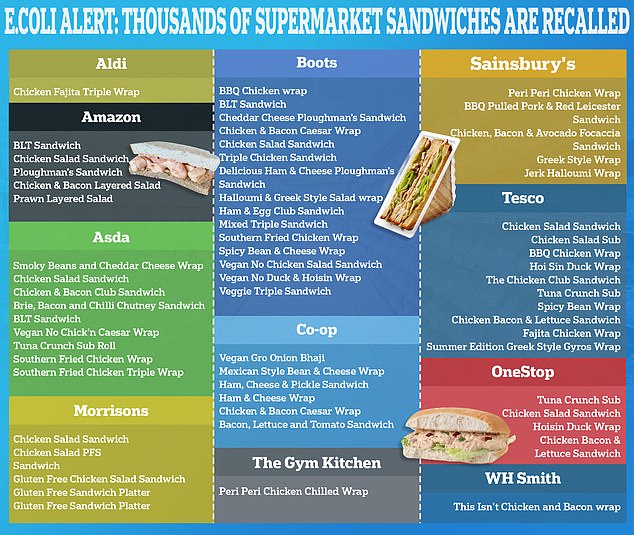E. coli: One person dies in outbreak linked to tainted salad, health chiefs confirm
One person is suspected of having died from the E. coli outbreak linked to contaminated lettuce leaves, health officials say.
No details have been released about the victim’s age or location. Health chiefs only state that they had an underlying medical condition and that they died last month.
The UK Health Security Agency (UKHSA) update also reported that a further 19 cases of infection with Shiga toxin-producing E. coli (STEC) were confirmed on June 25.
This brings the total number of cases to 275, with around half of known cases requiring hospital admission due to their infection.
Food safety chiefs have said they are ‘confident’ that an Apollo lettuce has caused the outbreak of the diarrhea-causing bug, but efforts are still underway to determine the cause
The infection has hospitalized 122 people and so far seven cases of severe hemolytic uremic syndrome (HUS), a medical emergency linked to STEC that can lead to kidney failure and death, have been reported.
Another death among STEC patients was also recorded by health officials, but based on medical data it is not believed to have been caused by the infection.
UKHSA said that although the number of new STEC cases is decreasing, they expect more cases in the coming days as further samples from suspected patients are analyzed.
The E. coli outbreak is believed to be linked to contaminated lettuce leaves and occurred earlier this month more than 60 Sandwiches, wraps and salads were sold in 11 large stores hit with ‘do not eat’ warnings as a precaution.
Darren Whitby, incident lead at the Food Security Agency, which is assisting UKHSA with the E. coli investigation, said while lettuce is still the prime suspect, investigations are ongoing.
‘While we are confident that the likely source of the outbreak is related to lettuce, work continues to confirm this and work with growers, suppliers and manufacturers to identify the source of the outbreak so that action can be taken to prevent a recurrence . ‘ he said.
Experts believe that the texture of lettuce makes it more susceptible to E. coli contamination, as the water is contaminated with infected animal feces and the fact that the lettuce has not been cooked, which normally kills the insects, increases the risk.
STEC is considered extremely contagious and in up to 15 percent of cases the bug can cause HUS, with children under five years of age most at risk.
A small proportion of adults may develop a similar condition, called thrombotic thrombocytopenic purpura (TTP).
Symptoms of STEC generally range from mild to bloody diarrhea, UKHSA says, with about half of infected people experiencing the latter.
Vomiting, fever, and stomach cramps are other telltale signs of an infection.
Although the majority of the 275 known cases are believed to have resulted from the consumption of contaminated food, two are believed to have been transmitted from person to person, for example parents caring for children who had contracted the bug.

More than 60 sandwiches, wraps and salads sold in 11 major stores were given a ‘do not eat’ warning earlier this month over concerns they could contain Shiga toxin-producing E.coli (STEC).
England has the lion’s share of cases with 182, with 58 in Scotland and 31 in Wales.
Four cases have also been reported in Northern Ireland, although it is believed these patients were infected while visiting England.
People are advised to contact NHS 111 or their GP if they or their children show symptoms of an E. coli infection.
For children under five, symptoms may include disinterest in breastfeeding or bottle feeding and signs of dehydration, such as fewer wet diapers.
Both adults and children are advised to call NHS 111 or their GP if they experience vomiting for two days or diarrhea for a week.
Anyone experiencing bloody diarrhea or bleeding from the bottom should call NHS 111 or their GP immediately.
Those who are infected are advised not to return to work, school or daycare until 48 hours after symptoms have disappeared.
